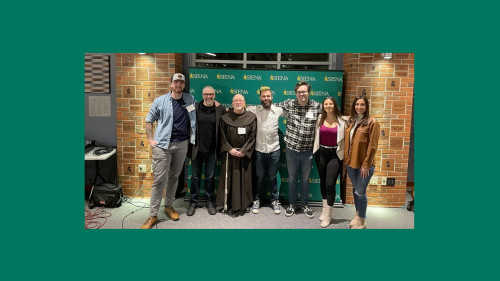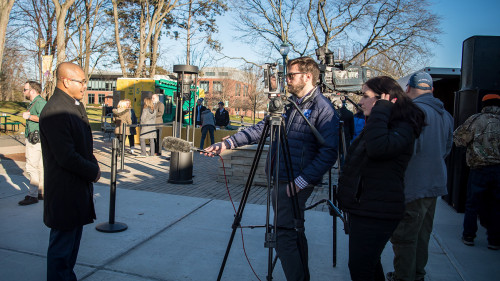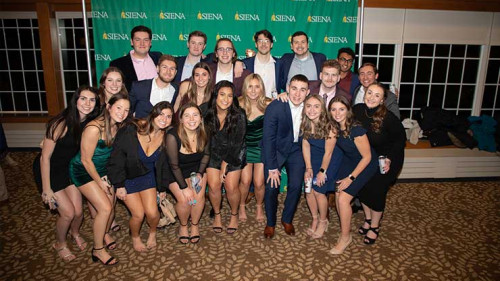
Awareness and action for environmental justice through theory and experience were on the agenda when Siena alumnus Fr. Joseph Rozansky ’71, O.F.M., led a campus conversation, “On Care of Our Common Home,” on March 10.
Fr. Rozansky recently returned to the United States this past fall after 10 years, where he served as Director of the Franciscan Office for Justice, Peace, and the Integrity of Creation (JPIC) in Rome, Italy. He first entered the Minor Seminary of the Franciscans in September 1963, and later received his Bachelor’s Degree in Philosophy from Siena College in 1971.
“When I came to Siena in 1968 and studied here for three years, I got a great education,” said Fr. Rozansky. “The atmosphere allowed me to think about where I was going and what I wanted to do.”
Fr. Rozansky’s path eventually led him to Brazil where he lived from 1975 to 1985. Here, he saw firsthand the difficulties regarding peace, poverty, and the environment and wanted to create a proactive conversation among the church community. From 1985 to 1996, he pursued a Master’s Degree in Economics from American University, and helped found and sustain the Brazil Network, a small NGO dedicated to working with Brazil.
Now, Fr. Rozansky has made it his mission to continually raise awareness for ecological sustainability and environmental justice among religious orders, local community members, and state legislature here in the states. In his presentation and conversation, he reflected on his 30+ years worth of experiences all over the world on this topic. After hearing about the hazardous effects of mining from gravel factories, both on the residents and environment, in Colombia and El Salvador, Fr. Rozansky brought the matter to Rome’s attention in 2008 as a program proposal, emphasizing that the voices of those affected could not be heard.
As a result, he and other members of the Franciscan Family were involved for many years in raising awareness around the issues addressed in Pope Francis’s 2015 Encyclical Laudato Si’. Pope Francis, inspired by the vision of St. Francis, has outlined principle themes and has issued a universal call for all who care for “Mother Earth,” to better understand the threats to our environment - our common home, and to become more concerned about the common good, sustainability, and the integral development of all persons.
“One of the things the Pope says in the Encyclical – and he’s insisted since he took over – is that everything is interconnected. It seems to me whatever we choose – if we work at that really hard and try to do our best – I think we’re going to find all the other problems, and we’re going to need to ask ourselves about integral approaches to how to deal with pollution in Albany or corruption in government – they all come together,” commented Fr. Rozansky.
In his concluding comments to the packed Sarazan Student Union room, Fr. Rozansky urged students and faculty alike to listen to the Pope’s Encyclical and to continue following in St. Francis of Assisi’s footsteps.
“The Pope is making a difference in the world; people are listening to him because they feel and think that he’s truthful and trying to do stuff … inside and outside the church. I do believe in education, I do believe in Siena, I do believe in the kind of themes and proposals that are coming out of Laudato Si’ – but I think the bottom line, which I learned the hard way at times, … was to apply the theories [to have experiences]. How will the principles you learn here be applicable where you go forth into the world?”
“I really enjoyed listening to Fr. Joe. I’m not an environmental studies major, but he definitely made me want to cut back on certain things in my own life to help the environment just a bit more,” said Jillian Gallo ’16, psychology major.
To watch the entire lecture click here.

